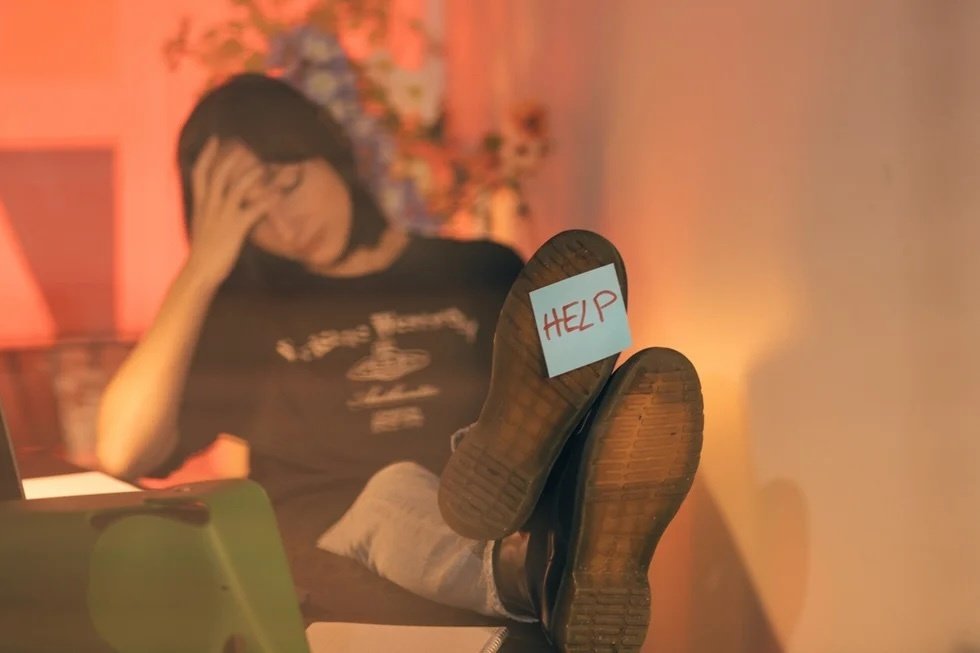Networking nerves: Mastering connections with social anxiety
Dec 12, 2023
7 mins


Writer
When it comes to landing a job, there’s no denying that knowing the right people gives you an advantage—and who you know relies heavily on your connections. According to a 2022 report from Reventify that polled approximately 250,000+ professionals, 42% of respondents said they found their current job thanks to some form of networking. If you’re naturally outgoing and love meeting new people, putting yourself out there to network is a breeze. But if social situations give you the jitters, then networking probably feels like a chore you avoid doing.
If you get a pit in your stomach when you hear the word ‘networking’, don’t let opportunities slip away just because your fear throws you a curveball. To find out how to conquer your social anxiety when meeting new people, we spoke with Scott Treas (MA, LPC), founder of Colorado-based LifeSketch Counseling and Coaching. Treas blends life coaching, career planning, and job search support to empower individuals to find a job and discover their true direction, build unshakeable confidence, and ignite the motivation needed to propel their job search forward.
Here’s what he had to share about networking with social anxiety, including tips, strategies, and words of encouragement to keep you motivated.
What is networking, and how does it affect someone who experiences social anxiety?
Networking boils down to a basic human need that Treas defines as the desire to know somebody and to be known. He notes that when we seek referrals and recommendations from other people, what we’re really looking for is to be recognized and seen.
“It’s about establishing connections that go beyond surface-level, and forming relationships that can truly make a difference in your professional life,” Treas begins. “But often, people experiencing social anxiety avoid networking because it is uncomfortable, complicated, or their version of networking actually makes their situations worse or harms relationships.”
Social anxiety, or “Social Phobia Disorder” according to the DSM-5, occurs when someone experiences an intense and perpetual fear of social situations where they perceive they could be judged or feel uncomfortable. While it’s natural to feel a bit nervous or awkward from time to time, social anxiety amplifies these feelings, which can result in complete avoidance of social events, difficulty in making connections, and even affect job performance. Treas notes that social anxiety is based on varying fears, which he describes as the following:
- Social scrutiny: This relates to feeling anxious about how others might judge or criticize you during networking events, making it difficult to present yourself confidently and potentially hindering positive professional connections.
- Social rejection: Social rejection refers to worrying about negative social experiences such as being excluded or rejected, the result of which could be avoiding social events altogether.
- Negative attention: Some people who experience social anxiety fear unwanted attention that could lead to embarrassment. The result of this could be hesitancy to participate in conversations, limiting the ability to make a positive impression.
- Ambiguous situations: Also known as the fear of the unknown. For some, social anxiety is triggered by unpredictable or unfamiliar situations.
- Hurting others: Do you ever fear saying the wrong thing? Social anxiety can arise from concern about accidentally saying or doing something offensive. The impact of this could be self-censorship, which prevents genuine connection.
Tips and strategies for managing social anxiety
While it might seem easier to just ‘power through’ and ignore your experience, it’s important that you don’t sweep your feelings under the rug; you want to recognize them and understand them so you can face them head-on. Awareness of your signs and triggers allows you to then apply the necessary techniques and mechanisms to cope with the challenges.
Treas outlines his strategy for managing social anxiety in networking situations. First, he suggests trying to make friends with your social anxiety, or at least get to know it. A good place to begin is listing the signs and symptoms that come up when you’re in a social situation that activates your anxiety. “Identify specific triggers or cues contributing to social anxiety, including internal triggers like negative self-talk, self-doubt, and self-criticism, as well as external triggers such as critical comments and perceived judgment from others,” Treas says. He further advises describing your immediate reactions to social challenges, like identifying any thoughts that arise (“I’m going to embarrass myself.”), physical sensations (increased heart rate, sweating), and emotional responses (fear, anxiety, self-consciousness).
Once you’ve observed how you respond, you want to get into your Parasympathetic Nervous System, which controls the body’s ability to relax. Treas says it’s essential to calm your body first before tackling your mind. “Employ techniques like slow, deep diaphragmatic breathing, engage in explosive exercise, ensure sufficient sleep, and practice mindfulness and meditation.”
Last, it’s time to challenge the mind and your negative and distorted beliefs. Per Treas, you want to identify automatic negative thoughts in social situations. “Recognize negative or distorted beliefs that contribute to social anxiety, including all-or-nothing thinking, overgeneralization, mind-reading, and personalization,” he explains. “Then, you can challenge the validity of these beliefs by examining evidence for and against them, considering alternative explanations, and adopting more balanced perspectives.” By reframing negative beliefs into positive and realistic ones, you begin to replace negative thoughts with compassionate and rational statements that focus on your strengths and positive qualities.
How to prepare for networking with social anxiety: Strategies to help you get ready
Networking can be an intimidating prospect for anyone, even those who don’t experience social anxiety. If you face the extra challenge of feeling scared of social situations, give yourself some grace and know that you’re not alone. Treas points out that avoiding networking is not the answer to alleviating social anxiety, and that in the end, we all have the same goal: “Everyone wants to feel normal and find a way to make mutually beneficial connections,” he affirms.
Start by breaking networking down into bite-size chunks to make it less overwhelming. Treas suggests a 5-step process to help you create your networking strategy.
- Set a goal. Get clear about what you want to achieve by talking to new people and why networking matters to you.
- Review your current network: Recognize you already have a network you can practice with. Your friends, family, or people you’ve met before can be a good starting point for getting your networking juices flowing.
- Find your people: Get intentional about your networking: who do you want to get to know better? Maybe it’s potential future employers, coworkers, or mentors. Establish your target audience to help you focus on making targeted and specific connections.
- Get involved: Networking is a strategy in action, so throw yourself in the ring. Participate in conversations, join groups, and share your thoughts online.
- Stay in touch: After you’ve talked to someone, remember to follow up! Keeping in touch with people you’ve connected with helps nurture those relationships over time.
He also mentions remembering that it’s okay to be nervous, but taking things step-by-step can help make networking easier and feel more natural.
Baby steps: Advice on dipping your toe into networking when you have social anxiety
Signing up for a thousand-person event as your first entry into networking when you have social anxiety might not be the best idea, so start small to build your capacity to converse and introduce yourself to new people.
Treas refers to this as ‘low-stakes networking’, noting that you can ease into networking by initiating conversations in minimal-pressure and everyday situations, such as at the store or on the sidewalk. “These casual interactions help you get accustomed to chatting with others, gradually building your comfort level and confidence,” he mentions.
As for initiating a conversion and keeping it going, Treas says to start by asking open-ended questions that encourage detailed responses and help find common ground. Since a conversation is a two-way street, practice active listening, reflecting, summarizing, and paraphrasing to show genuine interest. “And don’t forget about positive body language to convey attentiveness,” he adds. His top tip for a good conversation? Be vulnerable. “Foster connection by being honest and authentic. Share your story, and use humor to create a comfortable and relatable atmosphere.”
When wrapping a conversation up, Treas advises expressing appreciation for the interaction and sharing a friendly comment or well-wishing statement to leave on a positive note. But don’t just leave it at that: “Determine any next steps or action items. This could involve suggesting a follow-up meeting or discussing potential collaboration. And follow-up is also a must: get their contact information and follow up within 24 hours,” he says, sharing that a follow-up message expresses your gratitude and nurtures the relationship by showing you value it.
Now you’re in it: tips for networking with social anxiety
When it comes to networking with social anxiety, practical strategies can help to ease the process. To build confidence gradually, engage in role-playing with friends or mentors, initiate low-stakes conversations in everyday scenarios, and participate in discussions centered around shared interests. These steps aim to demystify networking for individuals grappling with social anxiety, emphasizing the value of positive and supportive connections with others.
Treas suggests an approach of Provide, Prepare, and Practice. First, consider what you bring to the table. “When networking, you want to adopt a mindset of giving first. Focus on being a valuable contributor to social interactions before expecting anything in return,” Treas says. Think about how you can offer your assistance, knowledge, or support to the person you’re conversing with. By helping others, you boost your self-esteem as well as establish a positive presence in networking situations.
Then, prepare. Take the time to learn about the people, events, or organizations you’ll be interacting with to build your confidence and make you more ready to engage in conversations. Treas adds, “Seek common interests with others to provide a solid starting point for meaningful discussions. Having a repertoire of interesting questions prepared in advance can also make it easier to initiate and sustain engaging conversations.”
Lastly, put it into practice and use exposure therapy to increase your experience and confidence in networking gradually. “Engage in role-playing scenarios with professionals, mentors, or trusted friends to simulate various networking situations and ask for constructive feedback to refine your approach and adjust your behavior accordingly. This deliberately both builds confidence and enhances social skills,” says Treas.
Key takeaways: Expert tips on how to network when you have social anxiety
As Treas puts it, the only way out of social anxiety is through it. “You must embrace being uncomfortable to overcome social anxiety and unlock your personal and professional potential,” he affirms. If your social anxiety is holding you back from showing people how outstanding you are, here are the main ideas to keep in mind:
- Identify your fear: Examine what specifically about social situations spark your anxiety so you can name it and start to understand it, identify your triggers, and develop techniques to cope with the challenge.
- Start small: Ease into feeling comfortable in social situations via everyday interactions and within your immediate network.
- Prepare accordingly: Apply Treas’ ‘Provide, Prepare, Practice’ strategy to help build a framework for your networking situation.
- Stay consistent: Avoiding or procrastinating anxiety-provoking situations (such as social interactions like networking) only exacerbates and sustains social anxiety. (This is called safety behavior.) Wondering how to create these connections? Build your network the same way you build relationships—via shared experiences over time.
- Think long-term. Networking isn’t about quick favors from friends and family; it’s about building a professional community with those you genuinely like and trust. The real value lies in cultivating lasting connections for sustained success.
- Keep it real. Above all, remember that networking is simply about building relationships, so stop making it feel unnatural or overly formal—the best approach is to be yourself!
Photo: Welcome to the Jungle
Follow Welcome to the Jungle on Facebook, LinkedIn, and Instagram, and subscribe to our newsletter to get our latest articles every week!

More inspiration: Network for the job hunt

Messaging recruiters: 7 mistakes to avoid on LinkedIn
Think messaging a recruiter on LinkedIn guarantees an interview? Not if you make these mistakes. Here's how to get noticed for the right reasons.
Dec 02, 2024

From tech to television: the benefits of alumni networking
Using your alumni network can be a game-changer for your career, allowing you to connect with people who share your background and experiences.
Jul 30, 2024

How to network in tech with no experience
Networking can be daunting for anyone, but entry-level tech workers have a unique challenge ahead.
May 30, 2024

Make your mark: How to build a personal brand for the job hunt
What’s the secret to success in today’s job market? None other than personal branding.
Apr 22, 2024

Telling your story: How to craft a LinkedIn bio that will stand out to recruiters
This social media tool is at the tip of your fingers, and we bet you don’t know what you’re missing …
Feb 13, 2024
The newsletter that does the job
Want to keep up with the latest articles? Twice a week you can receive stories, jobs, and tips in your inbox.

Looking for your next job?
Over 200,000 people have found a job with Welcome to the Jungle.
Explore jobs